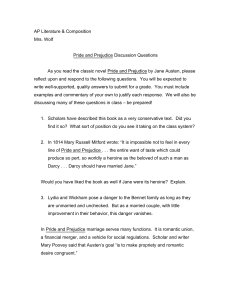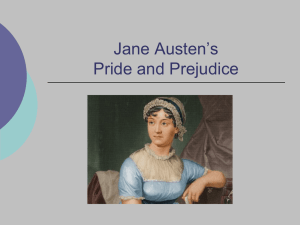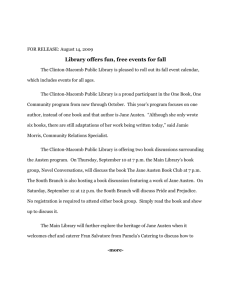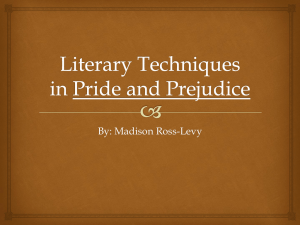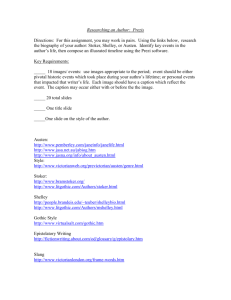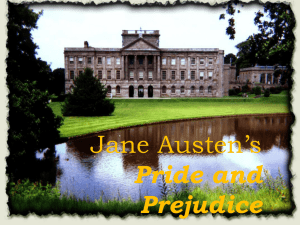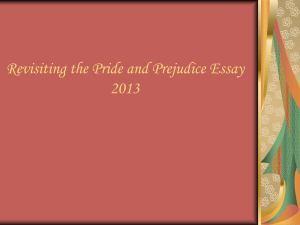Heather Rowland - AHS LIBRARY OF BABEL
advertisement
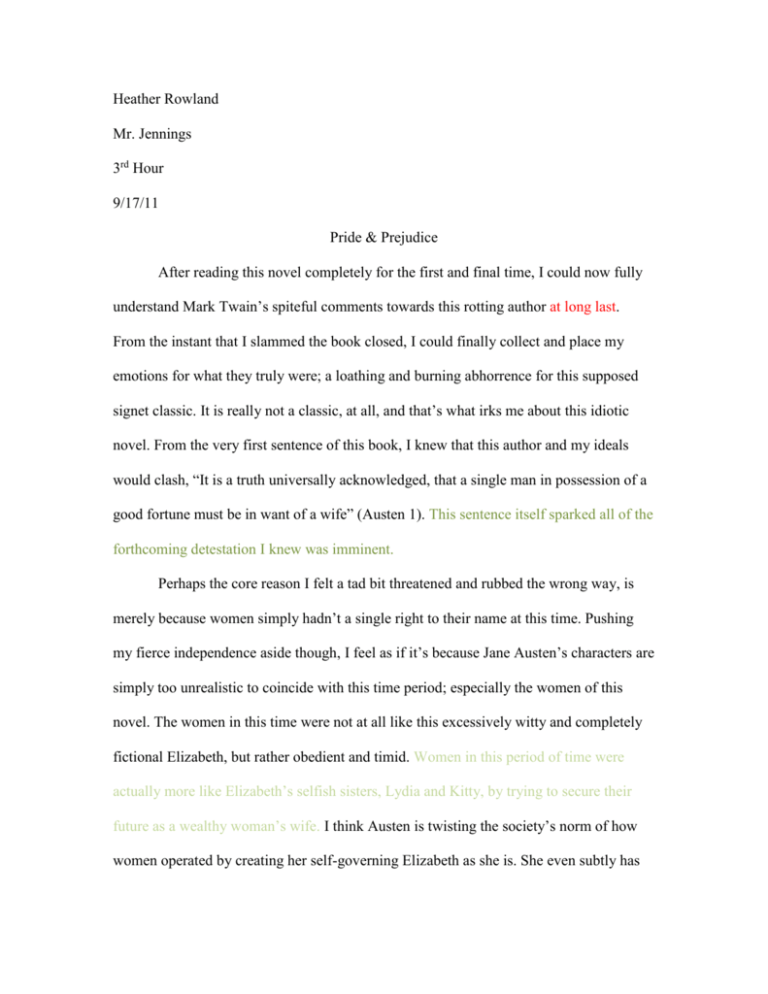
Heather Rowland Mr. Jennings 3rd Hour 9/17/11 Pride & Prejudice After reading this novel completely for the first and final time, I could now fully understand Mark Twain’s spiteful comments towards this rotting author at long last. From the instant that I slammed the book closed, I could finally collect and place my emotions for what they truly were; a loathing and burning abhorrence for this supposed signet classic. It is really not a classic, at all, and that’s what irks me about this idiotic novel. From the very first sentence of this book, I knew that this author and my ideals would clash, “It is a truth universally acknowledged, that a single man in possession of a good fortune must be in want of a wife” (Austen 1). This sentence itself sparked all of the forthcoming detestation I knew was imminent. Perhaps the core reason I felt a tad bit threatened and rubbed the wrong way, is merely because women simply hadn’t a single right to their name at this time. Pushing my fierce independence aside though, I feel as if it’s because Jane Austen’s characters are simply too unrealistic to coincide with this time period; especially the women of this novel. The women in this time were not at all like this excessively witty and completely fictional Elizabeth, but rather obedient and timid. Women in this period of time were actually more like Elizabeth’s selfish sisters, Lydia and Kitty, by trying to secure their future as a wealthy woman’s wife. I think Austen is twisting the society’s norm of how women operated by creating her self-governing Elizabeth as she is. She even subtly has Lady Charlotte take notice of Elizabeth’s perplexing sense of independence by saying, “‘Upon my word,’ said her ladyship, ‘you give your opinion very decidedly for so young a person-Pray what is your age?’” (Austen 151). This quote itself is a dead giveaway that Elizabeth shouldn’t be the character that she is; especially at the supposed age of twentyone! It would seem as if she wrote Elizabeth as a source wiser than her youthful age, but there is nothing significant that caused this particular Miss. Bennet to grow up as fast and aware as she is. I feel as if Austen herself crafted Elizabeth more so as something akin to her and other women at this time’s alter ego, than as her flawed self. She produced Elizabeth to speak her mind and not face any of the consequences of her actions. An alter ego in that I believe she gifted Elizabeth with the masculine qualities that her father and only men had possessed, “Mr. Bennet was so odd a mixture of quick parts, sarcastic humor, reserve, and caprice...” (Austen 3). Isn’t it surprising how much Mr. Bennet sounds more and more like our dear Elizabeth? I deem that Austen did this intentionally to exhibit to the audience that women in this time can also be more like men, and that it was possible. I trust she did this because men in this time were so independent that they hadn’t a care of what they said or whom it affected; as shown by Mr. Bennet’s carefree attitude towards everything in this novel. Next, I focused on a discussion in class that was brought up in favor of Mark Twain and his utter hatred for Jane Austen. Good old Mark Twain once admitted that, "All the great critics praise her art generously,” for her supposed gift of characterization. "To start with, they say she draws her characters with sharp discrimination and a sure touch. I believe that this is true, as long as the characters she is drawing are odious" (Twain). His words caused me to pause and rethink what I had once thought, and he hit the target spot on. Her characters supposed, “flaws,” are really nothing close to being flaws at all. Flaws such as being arrogantly prideful, judging others for simplistic reasons, and everyone being deviously handsome or beautiful; are some of the crimes that she has committed. I however, do admire Mark Twain for actually having the guts to voice his opinion of this feeble novel when no one else would; even if critics and crazed Austen fans alike detested him for it. Then, I noted how Jane Austen rashly had multiple amounts of men asking for this nearly imperfectly perfect girl’s hand in marriage. Elizabeth is vaguely described, and when she is, I picked up that Austen wrote through another character’s dialogue that there’s nothing truly spectacular about her. She even had her own mother, Mrs. Bennet state that, “...Lizzy is not a bit better than the others; and I am sure she is not half so handsome as Jane, nor half so good-humored as Lydia” (Austen 2). So how on Earth did Elizabeth catch the eye of three eligible men that two of the three could comfortably care for her for the rest of her life? I think it is because Austen wanted to make a bold statement that Elizabeth was obviously unlike other girls in this time, and that Elizabeth’s wit captivated some. In the beginning, she made Charlotte assume that Elizabeth was like every other girl, saying, "A lady's imagination is very rapid; it jumps from admiration to love, from love to matrimony, in a moment" (Austen 23). I noticed that Jane Austen had Elizabeth be the polar opposite of this exact quote. It would more likely be for Elizabeth as her imagination is very predictable; it jumps from the disliking encounter of Darcy, to semi-liking him, to hatefully judging him, then finally to adoringly understanding him, and then matrimony, after years. This precise explanation I made is specifically a part of the reason for why I so strongly dislike this character. Somehow someway, I feel slightly ashamed of my disgust for this novel, but I simply cannot help the way I feel. Perhaps this bizarre love story affected me because it just was not even considered a true love story to me. Every girl at one point in their life creates a fairytale ending for herself, maintaining the constant where her knight in shining armor sweeps in to save her from the scheming villain. But in this book, Elizabeth cleverly plays hard to get and coincidentally and ever so slowly, begins to “unknowingly” change the once prideful and wealthy Mr. Darcy into the man she wished for him to be. When her relatives visit the Pemberley House it is fascinating how Elizabeth’s true colors are revealed by her relatives configuring, “‘To be sure Lizzy,’ said her aunt, ‘he is not so handsome as Wickham; or rather he has not Wickham’s countenance, for his features are perfectly good. But how came you to tell us that he was so disagreeable?’” (Austen 231) Elizabeth herself did talk down of Darcy, and I believe others did as well, but her specifically trying to convince them of someone he was not; displeased me greatly. As well as when Mrs. Reynolds fondly spoke of Darcy being different than other men, she even said that, “‘To my fancy, it is only because he does not rattle away like other young men’” (Austen 223). But then later on we as the audience see how Darcy being around Elizabeth, changes him, and he does indeed begin to rattle away around her like all of the others. Let us not forget that this worker of his home has known him far longer than Elizabeth has, so I believe her to know him better. No one should ever have to change themselves to please their potential significant other; ever. In summary, the amount of courting going on in this novel makes me want to bash my head repeatedly into any nearby hard surface. I have not an ounce of sympathy or care for if the almighty Elizabeth Bennet denies Mr. Collin’s proposal, or Darcy’s, then pulls a one-eighty and practically fan girls over him. Jane Austen’s characters, particularly Elizabeth, would’ve been smacked for her insolence of being independent; and rightfully so! Her characters are simply unreal for this time period. Than lastly, the obnoxiousness of this book sets in with the cliché of a fairytale ending. In a letter to Joseph Twichell in 1898, Twain had fumed, "I have to stop every time I begin. Every time I read ‘Pride and Prejudice’ I want to dig her up and beat her over the skull with her own shin-bone" (Twain). As amusing as that heated statement is to read, I suppose Mark Twain may have taken his hatred for this book to a different level, but a small piece of me; completely agrees with him. Works Cited Austen, Jane. Pride and Prejudice. Austin: Harcourt Brace & C o m p a n y, 1 - 3 5 2 . P r i n t . Twain, Mark. "Quotes About Austen." goodreads. N.p., n.d. Web. 17 Sep 2011. <http://www.goodreads.com /quotes/tag/austen>.

